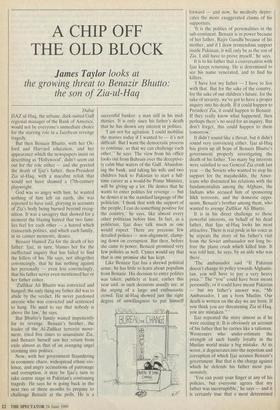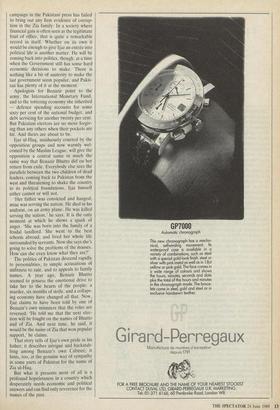A CHIP OFF THE OLD BLOCK
James Taylor looks at
the growing threat to Benazir Bhutto: the son of Zia-ul-Haq
Dubai IJAZ ul-Haq, the urbane, dark-suited Gulf regional manager of the Bank of America, would not be everyone's immediate choice for the starring role in a Jacobean revenge tragedy.
But then Benazir Bhutto, with her Ox- ford and Harvard education, and her appearance which the newspapers insist on describing as 'Hollywood', didn't seem cut out for the role either — and she greeted the death of Ijaz's father, then-President Zia ul-Haq, with a macabre relish that would not have shamed a 17th-century playwright.
God was so angry with him, he wanted nothing of him left on earth, she was reported to have said, glorying in accounts of Zia's body being burned beyond recog- nition. It was a savagery that showed for a moment the blazing hatred that two fami- lies feel for each other — a hatred which transcends politics, and which each family, in its calmer moments, denies.
Benazir blamed Zia for the death of her father: Ijaz, in turn, blames her for the ineffectual inquiry that has failed to find the killers of his. He says, not altogether convincingly, that he has nothing against her personally — even less convincingly, that his father never even mentioned her or her father either.
'Zulfikar Ali Bhutto was convicted and hanged; the only thing my father did was to abide by the verdict. He never pardoned anyone who was convicted and sentenced to hang. He used to say that nobody is above the law,' he says.
But Bhutto's family waited impatiently for its revenge. Benazir's brother, the leader of the Al-Zufikar terrorist move- ment, tried five times to assassinate Zia, and Benazir herself saw her return from exile almost as that of an avenging angel storming into politics.
Now, with her government floundering in economic chaos, widespread ethnic vio- lence, and angry accusations of patronage and corruption, it may be Ijaz's turn to take centre stage in Pakistan's continuing tragedy. He says he is going back in the next two or three months to prepare to challenge Benazir at the polls. He is a successful banker: a man still in his mid- thirties. It is only since his father's death that he has shown any interest in politics.
'I am not for agitation. I could mobilise the masses today if I wanted to — it's not difficult. But I want the democratic process to continue, so that we can challenge each other," he says. The view from his office looks out from Bahrain over the deceptive- ly calm blue waters of the Gulf. Abandon- ing the bank, and taking his wife and two children back to Pakistan to start a full- time career as a would-be Prime Minister, will be giving up a lot. He denies that he wants to enter politics for revenge — but he denies it in the standard language of the politician. 'I think that with the support of the people, I can do something positive for the country,' he says, like almost every other politician before him. In fact, as a politician, Ijaz does talk much as one would expect. There are precious few detailed policies — non-alignment, clamp- ing down on corruption. But then, before she came to power, Benazir promised very few policies as well. Cynics would say that that is one promise she has kept.
Like Benazir Ijaz has a shrewd political sense; he has little to learn about populism from Benazir. His decision to enter politics was taken, publicly at least, earlier this year and, as such decisions usually are, at the urging of a large and enthusiastic crowd. Ijaz ul-Haq showed just the right degree of unwillingness to put himself forward — and now, he modestly depre- cates the more exaggerated claims of his supporters.
'It is the politics of personalities in the sub-continent. Benazir is in power because
of her father, Rajiv Gandhi because of his mother, and if I draw tremendous support inside Pakistan, it will only be as the son of Zia. I still have to prove myself,' he says.
It is to his father that a conversation with Ijaz keeps returning. He is determined to see his name venerated, and to find his killers.
'I have lost my father — I have to live with that. But for the sake of the country,
for the sake of our children's future, for the sake of security, we've got to have a proper inquiry into his death. If it could happen to President Zia, it could happen to Benazir. If they really know what happened, then perhaps there's no need for an inquiry. But don't forget, this could happen to them tomorrow.'
It didn't sound like a threat, but it didn't sound very convincing either. Ijaz ul-Haq has given up all hope of Benazir Bhutto's government properly investigating the death of his father. Too many big interests were satisfied to see General Zia crash last year — the Soviets who wanted to stop his support for the mujaheddin, the Amer- icans who distrusted his relations with the fundamentalists among the Afghans, the Indians who accused him of sponsoring Sikh terrorists, and the domestic oppo- nents, Benazir's brother among them, who wanted to avenge Zulfikar Ali Bhutto.
It is in his direct challenge to those powerful interests, on behalf of his dead father, that Ijuz ul-Haq looks his most attractive. There is real pride in his voice as he repeats the story of his father's visit from the Soviet ambassador not long be- fore the plane crash which killed him. It was told him, he says, by an aide who was there.
'The ambassador said "If Pakistan doesn't change its policy towards Afghanis- tan, you will have to pay a very heavy price." The "you" could have been meant personally, or it could have meant Pakistan — but my father's answer was, "Mr Ambassador, I am a born Muslim. Our death is written on the day we are born. If you think you are threatening Zia ul-Haq, you are mistaken." ' Ijaz repeated the story almost as if he were reciting it. It is obviously an account of his father that he carries like a talisman.
Westerners who under-estimate the strength of such family loyalty in the Muslim world make a big mistake. At its worst, it degenerates into the nepotism and corruption of which Ijaz accuses Benazir's government. But that is the charge against which he defends his father most pas- sionately.
'You can point your finger at any of his policies, but everyone agrees that my father was incorruptible,' he says — and it is certainly true that a most determined campaign in the Pakistani press has failed to bring out any firm evidence of corrup- tion in the Zia family. In a society where financial gain is often seen as the legitimate fruit of office, that is quite a remarkable record in itself. Whether on its own it would be enough to give Ijaz an entrée into political life is another matter. He will be coming back into politics, though, at a time when the Government still has some hard economic decisions to make. There is nothing like a bit of austerity to make the last government seem popular, and Pakis- tan has plenty of it at the moment.
Apologists for Benazir point to the army, the International Monetary Fund, and to the tottering economy she inherited — defence spending accounts for some sixty per cent of the national budget, and debt servicing for another twenty per cent. But Pakistani electors are no more forgiv- ing than any others when their pockets are hit. And theirs are about to be.
Ijaz ul-Haq, assiduously courted by the opposition groups and now warmly wel- comed by the Muslim League, will give the opposition a central name in much the same way that Benazir Bhutto did on her return from exile. Everybody else sees the parallels between the two children of dead leaders, coming back to Pakistan from the west and threatening to shake the country to its political foundations. Ijaz himself either cannot or will not.
'Her father was convicted and hanged; mine was serving the nation. He died in his uniform, on an army plane. He was killed serving the nation,' he says. It is the only moment at which he shows a spark of anger. 'She was born into the family of a feudal landlord. She went to the best schools abroad, and lived her whole life surrounded by servants. Now she says she's going to solve the problems of the masses. How can she even know what they are?'
The politics of Pakistan descend rapidly to personalities, to simple accusations of unfitness to rule, and to appeals to family names. A year ago, Benazir Bhutto seemed to possess the emotional drive to take her to the hearts of the people: a murder, six months of strife, and a collaps- ing economy have changed all that. Now, Ijaz claims to have been told by one of Benazir's own ministers that the roles are reversed. 'He told me that the next elec- tion will be fought on the names of Bhutto and of Zia. And next time, he said, it would be the name of Zia that won popular support,' he claims.
That story tells of Ijaz's own pride in his father; it describes intrigue and backstab- bing among Benazir's own Cabinet; it hints, too, at the genuine way of sympathy in some parts of Pakistan for the name of Zia ul-Haq.
But what it presents most of all is a profound hopelessness in a country which desperately needs economic and political answers and can find only reverence for the names of the past.











































































 Previous page
Previous page